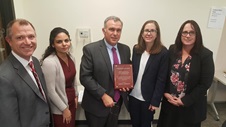Governor's Task Force on Justice for Abused Children
About the Task Force
The Governor’s Task Force on Justice for Abused Children (GTF, Task Force, or Governor's Task Force), first established in 1988, identified the need for greater coordination of agencies involved in the investigation, intervention and prosecution of child sexual abuse and serious physical abuse cases. The development of multidisciplinary teams (MDTs), that provide critical coordination at the beginning stages of an investigation, has provided a means of maximizing community resources that strengthen and improve interagency responses and interventions. The guiding principles and values that were established initially continue to guide the direction and focus of the Task Force. Since the development of the Governor’s Task Force on Justice for Abused Children in 1988, there have been many changes in membership.
_______________________________________
Navigate to:
- Agendas and Minutes
- 2024
- Archived Years (2013-2023)
- CJA 2021-2022 Federal Application
- Committees
- Contacts
- Members
-
Resources:



Happy 30th Anniversary to the Governor's Task Force on Justice for Abused Children
____________________
MEETINGS: Agendas & Minutes
2024 GTF Committee
June
January
____________________
Governor's Task Force on Justice for Abused Children Committees
The Multidisciplinary Team Evaluation Committee
In 2002, in accordance with Connecticut General Statute Sec. 17a-106a(c), a permanent Multidisciplinary Team (MDT) Evaluation Committee was established to review protocols and monitor and evaluate the performance of multidisciplinary teams. The MDT Evaluation Committee is a permanent GTF committee and is charged with reviewing the protocols of all multidisciplinary teams, monitoring and evaluating teams, and making recommendations for modifications to the system of multidisciplinary teams. This committee is elected by the Governor's Task Force membership. The committee's composition is diverse geographically, culturally and by discipline. Current membership includes representatives from child protection, forensic medical providers and interviewers, States Attorney's Office (prosecutors), mental health, victim services, the Attorney General's office and MDT coordinators.
Retreat Outcomes Committee
The Governor’s Task Force Executive Committee retreat was held on June 13, 2017 and included executive committee members as well as a diverse make up of professionals from GTF and its committees or workgroups. As a result of this meeting, retreat recommendations were presented and approved at the July 2017 task force meeting. One of the recommendations was to suspend several of the standing committees for the year as the task force completed strategic planning is several areas. During this time, the full task force meet as needed and these meetings replaced several of the Executive Committee meetings. In March 2018, the task force voted to eliminate the Executive Committee and increase the full task force meetings from quarterly to bi-monthly. The by-laws for the task force will be updated to reflect these changes.
The group reviewed current committees, workgroups and activities and agreed that ad-hoc workgroups for each of the following priority areas should be established to replace all the existing workgroups and committees and that the next six months should be used to develop a framework and plans for the next federal grant application which is due May 2018 as follows:
- MDT/CAC Evaluation & Quality Assurance (volunteer lead: Paula Schaffer) This ad-hoc group will develop a plan for how the CT and NCA standards and the MDT evaluation process can be aligned and potentially streamlined and how data is collected and utilized.
- Training (volunteer lead: Margaret Doherty) This ad-hoc group will assess what training is provided both GTF and CCA including Finding Words, Minimal Facts, MDT training; explore sustainability options, and identify training needs and gaps.
- System Gaps & Barriers (volunteer lead: John Leventhal) This ad-hoc group will look at system/service gaps and barriers as well practice fidelity issues (e.g., forensic interviewers, medical interviews, etc.) that have been previously brought to GTF; develop a systemic process for GTF to discuss and track system gaps/barriers on a regular basis and; identify strategies for GTF to develop a common policy platform or agenda.
- Child Fatality Response (volunteer lead: Faith Vos Winkel) This ad-hoc group will explore the potential of a developing a local pilot and a plan for implementation.
Training Committee
The primary focus of this committee is to identify needs and gaps in training, develop a plan to meet the training needs of the multiple disciplines involved in Connecticut teams and throughout the system, and award financial reimbursement for those wishing to attend training. The committee is chaired by Elizabeth Leaming, BS, JD Senior Assistant State’s Attorney Judicial District of Tolland and Kristen M. Clark, GTFJAC Coordinator. The training committee works with an established annual budget and added Finding Words and Minimal Facts as sub-committees.
______________________
CONTACTS:
- Kristen M. Clark, Coordinator
Governor's Task Force on Justice for Abused Children
The Village
331 Wethersfield Avenue
Hartford, CT 06114
Phone: 860-297-0549
Cell: 860-888-6394
Fax: 860-296-1033
e-mail: kclark@thevillage.org - Tammy Sneed, Director of the Office of Human Trafficking Services
Department of Children and Families
505 Hudson Street
Hartford, Connecticut 06106
Office: 860-550-6471
Cell: 860-462-4314
e-mail: tammy.sneed@ct.gov
______________________
Connecticut Statute on GTFJAC
Child Abuse Prevention and Treatment Act, 42 U.S.C. 5106c (c) State task forces
(1) General rule: Except as provided in paragraph (2), a State requesting assistance under this section shall establish or designate, and maintain, a State multidisciplinary task force on children's justice (hereinafter referred to as “State task force”) composed of professionals with knowledge and experience relating to the criminal justice system and issues of child physical abuse, child neglect, child sexual abuse and exploitation, and child maltreatment related fatalities. The State task force shall include--
(A) individuals representing the law enforcement community;
(B) judges and attorneys involved in both civil and criminal court proceedings related to child abuse and neglect (including individuals involved with the defense as well as the prosecution of such cases);
(C) child advocates, including both attorneys for children and, where such programs are in operation, court appointed special advocates;
(D) health and mental health professionals;
(E) individuals representing child protective service agencies;
(F) individuals experienced in working with children with disabilities;
(G) parents;
(H) representatives of parents' groups;
(I) adult former victims of child abuse or neglect; and
(J) individuals experienced in working with homeless children and youths (as defined in section 11434a of this title).
(2) Existing task force
As determined by the Secretary, a State commission or task force established after January 1, 1983, with substantially comparable membership and functions, may be considered the State task force for purposes of this subsection.
(d) State task force study
Before a State receives assistance under this section, and at three year intervals thereafter, the State task force shall comprehensively--
(1) review and evaluate State investigative, administrative and both civil and criminal judicial handling of cases of child abuse and neglect, including child sexual abuse and exploitation, as well as cases involving suspected child maltreatment related fatalities and cases involving a potential combination of jurisdictions, such as intrastate, interstate, Federal-State, and State-Tribal; and
(2) make policy and training recommendations in each of the categories described in subsection (e) of this section.
The task force may make such other comments and recommendations as are considered relevant and useful.
Connecticut Statute on Multidisciplinary Teams
Sec. 17a-106a. Multidisciplinary teams. Purpose. Composition. Confidentiality. Records of meetings.
(a) The Commissioner of Children and Families, may as department head of the lead agency, and the appropriate state's attorney establish multidisciplinary teams for the purpose of reviewing particular cases or particular types of cases or to coordinate the prevention, intervention and treatment in each judicial district to review selected cases of child abuse or neglect. The purpose of such multidisciplinary teams is to advance and coordinate the prompt investigation of suspected cases of child abuse or neglect, to reduce the trauma of any child victim and to ensure the protection and treatment of the child. The head of the local law enforcement agency or his designee may request the assistance of the Division of State Police within the Department of Public Safety for such purposes.
(b) Each multidisciplinary team shall consist of at least one representative of each of the following: (1) The state's attorney of the judicial district of the team, or his designee; (2) the Commissioner of Children and Families, or his designee; (3) the head of the local or state law enforcement agencies, or his designee; (4) a health care professional with substantial experience in the diagnosis and treatment of abused or neglected children, who shall be designated by the team members; (5) a member, where appropriate, of a youth service bureau; (6) a mental health professional with substantial experience in the treatment of abused or neglected children, who shall be designated by the team members; and (7) any other appropriate individual with expertise in the welfare of children that the members of the team deem necessary. Each team shall select a chairperson. A team may invite experts to participate in the review of any case and may invite any other individual with particular information germane to the case to participate in such review, provided the expert or individual shall have the same protection and obligations under subsections (f) and (g) of this section as members of the team.
(c) The Governor's task force for justice for abused children, through the subcommittee comprised of individuals with expertise in the investigation of child abuse and neglect, shall: (1) Establish and modify standards to be observed by multidisciplinary teams; (2) review protocols of the multidisciplinary teams; and (3) monitor and evaluate multidisciplinary teams and make recommendations for modifications to the system of multidisciplinary teams.
(d) All criminal investigative work of the multidisciplinary teams shall be undertaken by members of the team who are law enforcement officers and all child protection investigative work of the teams shall be undertaken by members of the team who represent the Department of Children and Families, provided representatives of the department may coordinate all investigative work and rely upon information generated by the team. The protocols, procedures and standards of the multidisciplinary teams shall not supersede the protocols, procedures and standards of the agencies who are on the multidisciplinary team.
(e) Each multidisciplinary team shall have access to and may copy any record, transcript, document, photograph or other data pertaining to an alleged child victim within the possession of the Department of Children and Families, any public or private medical facility or any public or private health professional provided, in the case of confidential information, the coordinator of the team, or his designee, identifies the record in writing and certifies, under oath, that the record sought is necessary to investigate child abuse or neglect and that the team will maintain the record as confidential. No person who provides access to or copies of such record upon delivery of certification under this section shall be liable to any third party for such action. The multidisciplinary team shall not be deemed to be a public agency under the Freedom of Information Act.
(f) No person shall disclose information obtained from a meeting of the multidisciplinary team without the consent of the participant of the meeting who provided such information unless disclosure is ordered by a court of competent jurisdiction or is necessary to comply with the provisions of the Constitution of the state of Connecticut.
(g) Each multidisciplinary team shall maintain records of meetings that include, but are not limited to, the name of the alleged victim and perpetrator, the names of the members of the multidisciplinary team and their positions, the decision or recommendation of the team and support services provided. In any proceeding to gain access to such records or testimony concerning matters discussed at a meeting, the privileges from disclosure applicable to the information provided by each of the participants at the meeting shall apply to all participants.

